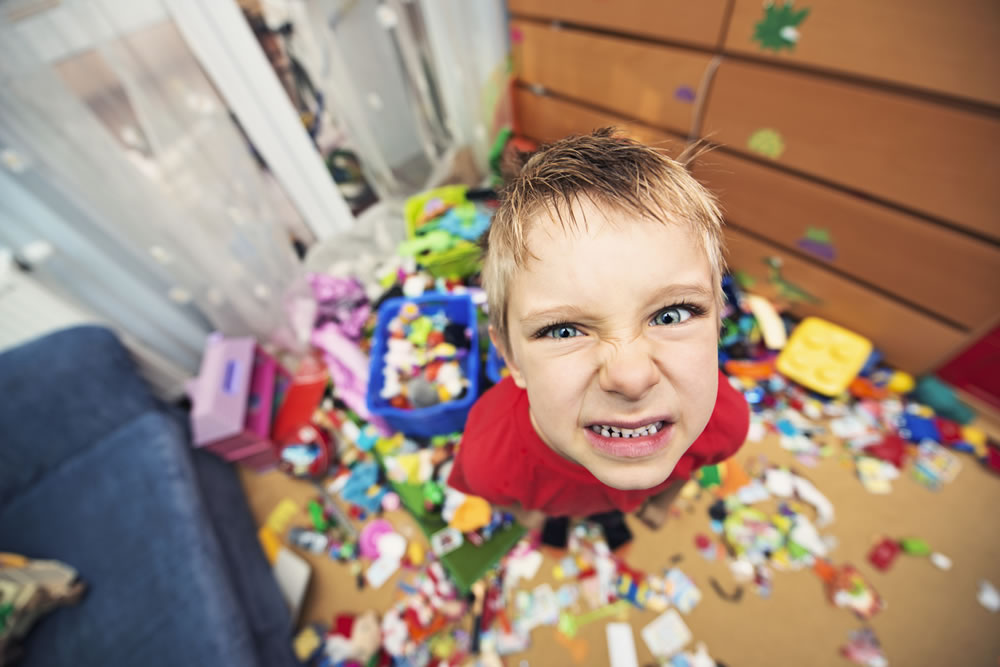
Child blames others for everything
read •

When something goes wrong in my 8-year-old's life (a Lego creation breaks or he loses his temper), he always blames someone else…even when he's clearly at fault. How can we help him see and accept more responsibility?
Lashing out when we're upset, and blaming others for our distress is a completely normal human reaction. Most of us gain the ability to refrain from these almost automatic reactions as we get older, but some people go through their lives with a "chip on their shoulder," blaming others and reacting angrily to imagined slights.
What causes this, and how can we help our children (and ourselves!) grow out of it?
All mammals, when they're in distress, go into fight, flight or freeze. So when your child's lego breaks, it can feel like an emergency to him. He's plunged into distress, and he goes into "fight." That means that he feels like attacking. Hopefully, now that he's eight, he doesn't throw the lego. But he's likely to lash out verbally, blaming whoever is closest. Maybe it's all your fault because you said something and distracted him, or you won't buy him the right lego. Or maybe the dog just walked too close to him!
He knows, deep inside, that it's really his "fault" as you say. And that feels terrible to him. So he's lashing out because he can't bear his own feelings of upset toward himself. To fend them off, he gets angry. It's an instant, automatic, response. The best defense is a good offense.
It's easy to see how universal this is if we look at our own tendency to lash out when we feel fear, disappointment or sadness:
- We almost run a red light, and yell at our kids for distracting us.
- We get a parking ticket and blame it on our partner for taking so long in the store.
- Someone we love dies, and we get angry at the doctor.
Our blaming others when we're upset isn't so different from our child blaming someone when his lego breaks. Hopefully, we're able to bite our tongue so we don't go on the attack. Once we're calm, we often see that our response wasn't fair.
How can you help your child learn this important life lesson, and hopefully learn not to go on the attack?
1. Stay calm.
Your child is on the attack because he feels like it's an emergency. Your calm attitude communicates that there's no emergency, and he doesn't need to be in "fight" mode, which helps him stop escalating and start calming down.
2. Empathize.
Acknowledging his experience will help him feel understood, less alone -- and less like it's an emergency. Bypass his anger and respond to the unhappiness that's driving the anger, which helps him understand his own emotions better: "Oh, no.... after all that work you did... and it fell apart! I'm so sorry!"
3. Don't attack back.
Your son is attacking to avoid his own pain. If he can pick a fight, it's a way of dumping the pain elsewhere so he doesn't have to feel it. Don't take the bait. Instead, when he says "It's your fault!" you can respond "You are pretty upset right now… It's so disappointing... understand."
If he's attacking someone besides you, you can say "Right now it seems like everyone else's fault, doesn't it? I'm so very sorry your lego fell apart.... I hear how disappointed you are.... You can be as mad as you want, but no yelling at your brother."
4. Model taking responsibility.
Your goal in this situation is to help your son assume his share of responsibility for whatever happens in his life, instead of blaming someone else. So model taking responsibility in whatever ways you can, both about this incident, and about any incident. In fact, when he "blames" by saying "It's all your fault!" you might respond "You wish I hadn't walked so close to you while you were trying to fix your lego.... Me too! I'm so sorry your lego broke!" You don't have to add "although of course you know it was not my fault." You're not blaming yourself. If there is no "fault" then there is nothing wrong with saying that you wish things had been different.
5. Teach repair.
Later, when he's no longer hurting, you can say to your son: "You were pretty upset when your lego broke, I know...…When you told your brother it was all his fault, that really hurt his feelings…I wonder how you can make things better with your brother?"
6. Create a no-blame household.
When kids grow up in a household where blame is a way of life, they're more defensive and more inclined to blame than to take responsibility. Not surprisingly, families who focus on solutions instead of blame raise children who are more able to take responsibility, because admitting a mistake doesn't mean they're "wrong" or "bad."
Why not experiment with a no-blame household? Every time you start to assign blame, teach yourself to ask "What can we do to solve this?" instead.
Dr. Laura
Click here to watch Dr. Laura's video "When Your Child Holds A Grudge and Won't Let it Go."




